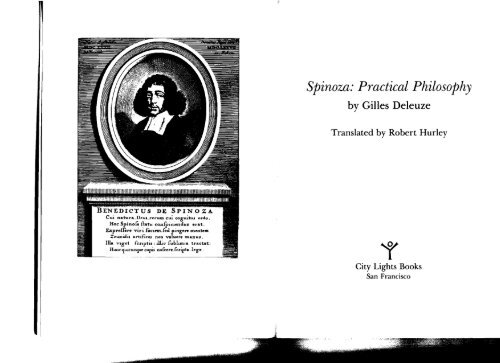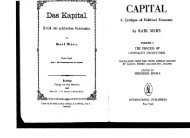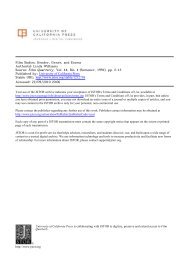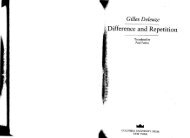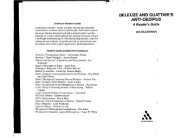Spinoza: Practical Philosophy - Una Chung
Spinoza: Practical Philosophy - Una Chung
Spinoza: Practical Philosophy - Una Chung
You also want an ePaper? Increase the reach of your titles
YUMPU automatically turns print PDFs into web optimized ePapers that Google loves.
<strong>Spinoza</strong>: <strong>Practical</strong> <strong>Philosophy</strong><br />
by Gilles Deleuze<br />
Translated by Robert Hurley<br />
Cui<br />
cui eognitm oreio.<br />
Hoc SpinoC. Habl. cO.l11piciend", erat.<br />
Exprc.-iTerc viri faciem.fed ping.... lUeJtum<br />
-r<br />
Z.uxidls artihns non val"• ..., ttl.nus.<br />
Ilia Vlg'Ct : .i.ll.ic fubl.mia tracht:<br />
HWlc'iUICuru.lUfO cu.pis nofct'.re,{cripta leg•.<br />
City Lights Books<br />
San Francisco
This book was originally published as <strong>Spinoza</strong>: Philosophie pratique,<br />
© 1970 by Presses Universitaires de France. A revised and expanded<br />
edition was published © J98 J by Les Editions de Minuit.<br />
First edition in English, City Lights Books, 1988<br />
Translation and preface © 1988 by Robert Hurley<br />
Cover: Meditation by the Sea (Unidentified Artist) ca. 1855.<br />
Courtesy, Museum of Fine Arts, Boston;<br />
M. and M. Karolik Collection<br />
Book design by Patricia Fujii<br />
Library of Congress Cataloging-in-Publication Data<br />
Deleuze, Gilles.<br />
<strong>Spinoza</strong> : practical philosophy.<br />
Translation of: <strong>Spinoza</strong>, Philosophie pratique.<br />
1. <strong>Spinoza</strong>, Benedictus de, 1632-1677. I. Title.<br />
B3998.D38513 1988 170'.92'4 88-2600<br />
ISBN-13: 978-0-87286-218-0<br />
Visit our website: www.citylights.com<br />
Table of Contents<br />
Preface..................................... .<br />
Chapter One: Life of <strong>Spinoza</strong> .................... 3<br />
Chapter Two: On the Difference between The Ethics<br />
and a Morality . . . . . . . . . . . . . . . . . . . . . . . . . . . . . 17<br />
Chapter Three: The Letters on Evil<br />
(correspondence with Blyenbergh) .............. 30<br />
Chapter Four: Index of the Main Concepts<br />
of the Ethics . . . . . . . . . . . . . . . . . . . . . . . . . . . . . . . 44<br />
Chapter Five: <strong>Spinoza</strong>'s Evolution (On the<br />
Noncompletion of the Treatise on the Intellect) ..... 110<br />
Chapter Six: <strong>Spinoza</strong> and Us ................... 122<br />
CITY LIGHTS BOOKS are edited by Lawrence Ferlinghetti and<br />
Nancy 1. Peters and published at the City Lights Bookstore.<br />
261 Columbus Avenue, San Francisco, CA 94133.
) ,<br />
16 / Gilles Deleuz.e<br />
The two major editions are that of Van Vloten and Land<br />
(1882-1884) and that of Gebhart (1925).<br />
The principal French translations are: for the major part of<br />
the work, that ofAppuhn (Garnier) and that ofCaillois, Frances,<br />
and Misraki (Pleiade); for the Ethics, the fine translation by<br />
Guerinot (Pelletan); for the Treatise on the Emendation ofthe Intellect,<br />
that of Koyre (Vrin). The Outline ofHebrew Grammar, which<br />
contains some extremely valuable remarks on the subject, the attribute,<br />
the mode, and true forms in Hebrew, has been translated<br />
by JOi!1 and Jocelyne Askenazi, with a preface by Alquie<br />
(Vrin).<br />
Martial Gueroult has published a systematic commentary on<br />
the Ethics, proposition by proposition. Two volumes have appeared<br />
to date, corresponding to the first two parts of the Ethics<br />
(Aubies-Montaigne).<br />
The three basic texts on <strong>Spinoza</strong>'s life are: the one by Lucas, a<br />
confused admirer who claims to have known <strong>Spinoza</strong>; the one by<br />
Colerus, who is reserved; the one by Pierre Bayle, who is hostile<br />
and caricatural. The two great scholarly biographies are by<br />
Freudenthal (1899) and by Dunin-Borkowski (1933-1936).<br />
A description of the presumed portraits of <strong>Spinoza</strong>, along<br />
with biographical material and information concerning manuscripts<br />
and editions, can be found in a catalogue of the Institut<br />
neerlandais de Paris [Dutch Institute of Paris] (<strong>Spinoza</strong>, troisieme<br />
centenaire de la mort du philosophe, 1977).<br />
Note on the Translation<br />
I have relied on the English translation of <strong>Spinoza</strong> by Edwin Curley,<br />
The Collected Works of<strong>Spinoza</strong>, Volume J, Princeton University Press,<br />
1985. There is at least one other good translation of the Ethics, by<br />
Samuel Shirley, The Ethics and Selected Letters, Hackett Publishing Co,<br />
1982. The Hackett volume is inexpensive.<br />
-R.H.<br />
Chapter Two<br />
...._@.--......<br />
ON THE DIFFERENCE<br />
BETWEEN THE ETHICS<br />
AND A MORALITY<br />
No philosopher was ever more worthy, but neither was any<br />
philosopher more maligned and hated. To grasp the reason for<br />
this it is not enough to recall the great theoretical thesis of Spinozism:<br />
a single substance having an infinity of attributes, Deus<br />
sive Natura, all "creatures" being only modes of these attributes<br />
or modifications of this substance. It is not enough to show how<br />
pantheism and atheism are combined in this thesis, which denies<br />
the existence of a moral, transcendent, creator God. We must<br />
start rather from the practical theses that made Spinozism an<br />
object of scandal. These theses imply a triple denunciation: of<br />
"consciousness," of "values," and of "sad passions." These are<br />
the three major resemblances with Nietzsche. And already in<br />
<strong>Spinoza</strong>'s lifetime, they are the reasons for his being accused of<br />
materialism, immoralism, and atheism.<br />
I. A devaluation of consciousness (in favor of thought): SpinoUl the<br />
materialist.<br />
<strong>Spinoza</strong> offers philosophers a new model: the body. He proposes<br />
to establish the body as a model: "We do not know what<br />
the body can do ... " This declaration of ignorance is a provocation.<br />
We speak ofconsciousness and its decrees, ofthe will and<br />
its effects, of the thousand ways of moving the body, ofdominating<br />
the body and the passions-but we do not even know what a<br />
17
18 I Gilles Deleuze<br />
body can do. l Lacking this knowledge, we engage in idle talk. As<br />
Nietzsche will say, we stand amazed before consciousness, but<br />
"the truly surprising thing is rather the body ... "<br />
Yet, one of the most famous theoretical theses of <strong>Spinoza</strong> is<br />
known by the name of parallelism; it does not consist merely in<br />
denying any real causality between the mind and the body, it disallows<br />
any primacy of the one over the other. If<strong>Spinoza</strong> rejects<br />
any superiority of the mind over the body, this is not in order to<br />
establish a superiority of the body over the mind, which would<br />
be no more intelligible than the converse. The practical significance<br />
of parallelism is manifested in the reversal of the traditional<br />
principle on which Morality was founded as an enterprise<br />
of domination of the passions by consciousness. It was said that<br />
when the body acted, the mind was acted upon, and the mind did<br />
not act without the body being acted upon in turn (the rule of<br />
the inverse relation, cf. Descartes, The Passions of the Soul, articles<br />
1 and 2). According to the Ethics, on the contrary, what is an<br />
action in the mind is necessarily an action in the body as well,<br />
and what is a passion in the body is necessarily a passion in the<br />
mind. 2 There is no primacy of one series over the other.<br />
What does <strong>Spinoza</strong> mean when he invites us to take the body<br />
as a model It is a matter of showing that the body surpasses the<br />
knowledge that we have ofit, and that thought likewise surpasses the<br />
consciousness that we have of it. There are no fewer things in the<br />
mind that exceed our consciousness than there are things in the<br />
body that exceed our knowledge. So it is by one and the same<br />
movement that we shall manage, ifpossible, to capture the power<br />
of the body beyond the given conditions of our knowledge,<br />
and to capture the power of the mind beyond the given conditions<br />
of our consciousness. One seeks to acquire a knowledge of<br />
the powers of the body in order to discover, in a parallel fashion,<br />
the powers of the mind that elude consciousness, and thus to be<br />
able to compare the powers. In short, the model of the body, according<br />
to <strong>Spinoza</strong>, does not imply any devaluation of thought<br />
in relation to extension, but, much more important, a devalu-<br />
I. Ethics, III, 2, scholium.<br />
2. Ethics, Ill, 2, schol. (and II, 13, schol.).<br />
<strong>Spinoza</strong>: <strong>Practical</strong> <strong>Philosophy</strong> I 19<br />
ation of consciousness in relation to thought: a discovery of the<br />
unconscious, of an unconscious of thought just as profound as the<br />
unknown ofthe body.<br />
The fact is that consciousness is by nature the locus ofan illusion.<br />
Its nature is such that it registers effects, but it knows nothing<br />
ofcauses. The order ofcauses is defined by this: each body in<br />
extension, each idea or each mind in thought are constituted by<br />
the characteristic relations that subsume the parts of that body,<br />
the parts of that idea. When a body "encounters" another body,<br />
or an idea another idea, it happens that the two relations sometimes<br />
combine to form a more powerful whole, and sometimes<br />
one decomposes the other, destroying the cohesion of its parts.<br />
And this is what is prodigious in the body and the mind alike,<br />
these sets ofliving parts that enter into composition with and decompose<br />
one another according to complex laws. s The order of<br />
causes is therefore an order of composition and decomposition<br />
of relations, which infinitely affects all of nature. But as conscious<br />
beings, we never apprehend anything but the effects of<br />
these compositions and decompositions: we experiencejoy when<br />
a body encounters ours and enters into composition with it, and<br />
sadness when, on the contrary, a body or an idea threaten our<br />
own coherence. We are in a condition such that we only take in<br />
"what happens" to our body, "what happens" to our mind, that<br />
is, the effect of a body on our body, the effect of an idea on our<br />
idea. But this is only our body in its own relation, and our mind<br />
in its own relation, and the other bodies and other minds or<br />
ideas in their respective relations, and the rules according to<br />
which all these relations compound with and decompose one another;<br />
we know nothing of all this in the given order of our<br />
knowledge and our consciousness. In short, the conditions under<br />
which we know things and are conscious of ourselves condemn<br />
us to have only inadequate ideas, ideas that are confused and<br />
mutilated, effects separated from their real causes: t That is why<br />
it is scarcely possible to think that little children are happy, or<br />
that the first man was perfect: ignorant of causes and natures,<br />
3. Even the mind has a very large number of parts: cr. Ethics, II, 15.<br />
4. Ethics, II, 28, 29.
20 / Gilles Deleuze<br />
reduced to the consciousness of events, condemned to undergo<br />
effects, they are slaves of everything, anxious and unhappy,<br />
in proportion to their imperfection. (No one has been<br />
more forceful than <strong>Spinoza</strong> in opposing the theological tradition<br />
of a perfect and happy Adam.)<br />
How does consciousness calm its anguish How can Adam<br />
imagine himself happy and perfect Through the operation of<br />
a triple illusion. Since it only takes in effects, consciousness<br />
will satisfy its ignorance by reversing the order of things, by<br />
taking effects for causes (the illusion offinal causes): it will construe<br />
the effect of a body on our body as the final cause of its<br />
own actions. In this way it will take itself for the first cause,<br />
and will invoke its power over the body (the illusion offree decrees).<br />
And where consciousness can no longer imagine itself<br />
to be the first cause, nor the organizer of ends, it invokes a<br />
God endowed with understanding and volition, operating by<br />
means of final causes or free decrees in order to prepare for<br />
man a world commensurate with His glory and His punishments<br />
(the theological illusion).!" Nor does it suffice to say that<br />
consciousness deludes itself: consciousness is inseparable from<br />
the triple illusion that constitutes it, the illusion of finality, the<br />
illusion of freedom, and the theological illusion. Consciousness<br />
is only a dream with one's eyes open: "The infant believes<br />
he freely wants the milk; the angry child that he freely wants<br />
vengeance; and the timid, flight. So the drunk believes that it<br />
is from a free decision of the mind that he speaks the things he<br />
later, when sober, wishes he had not said. "6<br />
It is still necessary for consciousness itself to have a cause.<br />
<strong>Spinoza</strong> sometimes defines desire as "appetite together with<br />
consciousness of the appetite." But he specifies that this is<br />
only a nominal definition of desire, and that consciousness<br />
adds nothing to appetite ("we neither strive for, nor will, neither<br />
want, nor desire anything because we judge it to be good;<br />
on the contrary, we judge something to be good because we<br />
5. Ethics, I, appendix.<br />
6. Ethics, 111,2, schol.<br />
,'if <strong>Spinoza</strong>: <strong>Practical</strong> <strong>Philosophy</strong> / 21<br />
strive for it, will it, want it, and desire it"). 7 We need, then, to<br />
arrive at a real definition of desire, one that at the same time<br />
shows the "cause" by which consciousness is hollowed out, as it<br />
were, in the appetitive process. Now, the appetite is nothing else<br />
but the effort by which each thing strives to persevere in its being,<br />
each body in extension, each mind or each idea in thought<br />
(conatus). But because this effort prompts us to act differently according<br />
to the objects encountered, we should say that it is, at<br />
every moment, determined by the affections that come from the<br />
objects. These determinative affections are necessarily the cause ofthe<br />
consciousness ofthe conatus. 8 And since the affections are not separable<br />
from a movement by which they cause us to go to a greater<br />
or lesser perfection (joy and sadness), depending on whether<br />
the thing encountered enters into composition with us, or on the<br />
contrary tends to decompose us, consciousness appears as the<br />
continual awareness of this passage from greater to lesser, or<br />
from lesser to greater, as a witness ofthe variations and determinations<br />
of the conatus functioning in relation to other bodies or<br />
other ideas. The object that agrees with my nature determines<br />
me to form a superior totality that includes us, the object and<br />
myself. The object that does not agree with me jeopardizes my<br />
cohesion, and tends to divide me into subsets, which, in the extreme<br />
case, enter into relations that are incompatible with my<br />
constitutive relation (death). Consciousness is the passage, or<br />
rather the awareness of the passage from these less potent totalities<br />
to more potent ones, and vice versa. It is purely transitive.<br />
But it is not a property of the Whole or ofany specific whole; it<br />
has only an informational value, and what is more, the information<br />
is necessarily confused and distorted. Here again, Nietzsche<br />
is strictly <strong>Spinoza</strong>n when he writes: "The greater activity is unconscious;<br />
consciousness usually only appears when a whole<br />
wants to subordinate itself to a superior whole. Itis primarily the<br />
consciousness of this superior whole, of reality external to the<br />
ego. Consciousness is born in relation to a being of which we<br />
7. Ethics, III, 9, schol.<br />
8. Ethics, III, definition of Desire ("in order to involve the cause of this<br />
consciousness in my definition ... ").
22 / Gilles Deleuze<br />
could be a function; it is the means by which we incorporate into<br />
that being."<br />
II. A devaluation ofall values, and ofgood and evil in particular (in<br />
favor of"good" and "bad"): <strong>Spinoza</strong> the immoralist.<br />
"Thou shalt not eat of the fruit ... ": the anxious, ignorant<br />
Adam understands these words as the expression of a prohibition.<br />
And yet, what do they refer to To a fruit that, as such, will<br />
poison Adam if he eats it. This is an instance of an encounter<br />
between two bodies whose characteristic relations are not compatible:<br />
the fruit will act as a poison; that is, it will determine the<br />
parts ofAdam's body (and paralleling this, the idea of the fruit will<br />
determine the parts of his mind) to enter into new relations that no<br />
longer aceord with his own essence. But because Adam is ignorant of<br />
causes, he thinks that God morally forbids him something,<br />
whereas God only reveals the natural consequence of ingesting<br />
the fruit. <strong>Spinoza</strong> is categorical on this point: all the phenomena<br />
that we group under the heading of Evil, illness, and death, are<br />
of this type: bad encounters, poisoning, intoxication, relational<br />
decomposition. 9<br />
In any case, there are always relations that enter into composition<br />
in their particular order, according to the eternal laws of<br />
nature. There is no Good or Evil, but there is good and bad.<br />
"Beyond Good and Evil, at least this does not mean: beyond good<br />
and bad."JO The good is when a body directly compounds its relation<br />
with ours, and, with all or part ofits power, increases ours.<br />
A food, for example. For us, the bad is when a body decomposes<br />
our body's relation, although it still combines with our parts, but<br />
in ways that do not correspond to our essence, as when a poison<br />
breaks down the blood. Hence good and bad have a primary, objective<br />
meaning, but one that is relative and partial: that which<br />
agrees with our nature or does not agree with it. And consequently,<br />
good and bad have a secondary meaning, which is subjective<br />
and modal, qualifying two types, two modes of man's<br />
existence. That individual will be called good (or free, or ration-<br />
9. Theological-Political Treatise, chap. 4. And Letter XIX, to Blyenbergh.<br />
10. Nietzsche, On the Genealogy ofMorals, First Essay, section 17.<br />
II. Cf. the text on suicide, Ethics, IV, 20 schol.<br />
<strong>Spinoza</strong>: <strong>Practical</strong> <strong>Philosophy</strong> / 23<br />
ai, or strong) who strives, insofar as he is capable, to organize his<br />
encounters, to join with whatever agrees with his nature, to<br />
combine his relation with relations that are compatible with his,<br />
and thereby to increase his power. For goodness is a matter of<br />
dynamism, power, and the composition of powers. That individual<br />
will be called bad, or servile, or weak, or foolish, who lives<br />
haphazardly, who is content to undergo the effects of his encounters,<br />
but wails and accuses every time the effect undergone<br />
does not agree with him and reveals his own impotence. For, by<br />
lending oneself in this way to whatever encounter in whatever<br />
circumstance, believing that with a lot of violence or a little<br />
guile, one will always extricate oneself, how can one fail to have<br />
more bad encounters than good How can one keep from destroying<br />
oneself through guilt, and others through resentment,<br />
spreading one's own powerlessness and enslavement everywhere,<br />
one's own sickness, indigestions, and poisons In the end,<br />
one is unable even to encounter oneself. I I<br />
In this way, Ethics, which is to say, a typology of immanent<br />
modes of existence, replaces Morality, which always refers existence<br />
to transcendent values. Morality is the judgment of God,<br />
the system of Judgment. But Ethics overthrows the system of<br />
judgement. The opposition of values (Good-Evil) is supplanted<br />
by the qualitative difference of modes of existence (good-bad).<br />
The illusion of values is indistinguishable from the illusion of<br />
consciousness. Because it is content to wait for and take in effects,<br />
consciousness misapprehends all of Nature. Now, all that<br />
one needs in order to moralize is to fail to understand. It is clear<br />
that we have only to misunderstand a law for it to appear to us in<br />
the form of a moral "You must." If we do not understand the<br />
rule of three, we will apply it, we will adhere to it, as a duty.<br />
Adam does not understand the rule of the relation of his body<br />
with the fruit, so he interprets God's word as a prohibition.<br />
Moreover, the confused form of moral law has so compromised<br />
the law of nature that the philosopher must not speak ofnatural<br />
laws, but only of eternal truths: "The application of the word
24 I Gilles Deleuze<br />
'law' to natural things seems to be metaphorical, and the ordinary<br />
meaning of law is simply a command.... "12 As Nietzsche<br />
says concerning chemistry, i.e., the science of antidotes<br />
and poisons, one must be wary of the word law, which has a<br />
moral aftertaste.<br />
It is easy, however, to separate the two domains-that of<br />
the eternal truths ofNature and that of the moral laws ofinstitutions-if<br />
only one considers their effects. Let us take consciousness<br />
at its word: moral law is an imperative; it has no<br />
other effect, no other finality than obedience. This obedience<br />
may be absolutely necessary, and the commands may be justified,<br />
but that is not the issue. Law, whether moral or social,<br />
does not provide us with any knowledge; it makes nothing<br />
known. At worst, it prevents the formation of knowledge (the<br />
law ofthe tyrant). At best, it prepares for knowledge and makes<br />
it possible (the law ofAbraham or of Christ). Between these two<br />
extremes, it takes the place of knowledge in those who, because<br />
of their mode of existence. are incapable of knowledge<br />
(the law ofMoses). But in any case. a difference of nature is constantly<br />
manifested between knowledge and morality, between<br />
the relation of command and obedience and the relation of<br />
the known and knowledge. The tragedy of theology and its<br />
harmfulness are not just speculative, according to <strong>Spinoza</strong>;<br />
they are owing to the practical confusion which theology instills<br />
in us between these two orders that differ in nature. At<br />
the least. theology considers that Scripture lays the foundation<br />
for knowledge. even if this knowledge must be developed<br />
in a rational manner, or even transposed, translated. by reason:<br />
whence the hypothesis of a moral. creating, and transcendent<br />
God. In this, as we shall see, there is a confusion that<br />
compromises the whole of ontology; the history ofa long error<br />
whereby the command is mistaken for something to be understood.<br />
obedience for knowledge itself, and Being for a Fiat.<br />
Law is always the transcendent instance that determines the<br />
opposition of values (Good-Evil), but knowledge is always the<br />
12. Theological-Political Treatise, chap. 4<br />
··.··'\' ,}'<br />
, ".<br />
1 .<br />
<strong>Spinoza</strong>: <strong>Practical</strong> <strong>Philosophy</strong> I 25<br />
immanent power that determines the qualitative difference of<br />
modes of existence (good-bad).<br />
III. A devaluation ofall the "sad passions" (in favor ofjoy): <strong>Spinoza</strong><br />
the atheist.<br />
IfEthics and Morality merely interpreted the same precepts in<br />
a different way, the distinction between them would only be<br />
theoretical. This is not the case. Throughout his work, <strong>Spinoza</strong><br />
does not cease to denounce three kinds of personages: the man<br />
with sad passions; the man who exploits these sad passions, who<br />
needs them in order to establish his power; and the man who is<br />
saddened by the human condition and by human passions in<br />
general (he may make fun ofthese as much as he disdains them,<br />
but this mockery is a bad The slave, the tyrant, and<br />
the priest ... , the moralist trinity. Since Epicurus and Lucretius,<br />
the deep implicit connection between tyrants and slaves has<br />
never been more clearly shown: "In despotic statecraft, the supreme<br />
and essential mystery is to hoodwink the subjects, and to<br />
mask the fear. which keeps them down, with the specious garb of<br />
religion. so that men may fight as bravely for slavery as for safety,<br />
and count it not shame but highest honor to risk their blood<br />
and lives for the vainglory ofa tyrant. "14 This is possible because<br />
the sad passion is a complex that joins desire's boundlessness to<br />
the mind's confusion. cupidity to superstition. "Those who most<br />
ardently embrace every sort of superstition cannot help but be<br />
those who most immoderately desire external advantages." The<br />
tyrant needs sad spirits in order to succeed, just as sad spirits<br />
need a tyrant in order to be content and to multiply. In any case,<br />
what unites them is their hatred of life, their resentment against<br />
life. The Ethics draws the portrait of the resentful man, for whom<br />
all happiness is an offense, and who makes wretchedness or impotence<br />
his only passion. "But those who know how to break<br />
men's minds rather than strengthen them are burdensome both<br />
to themselves and to others. That is why many, from too great<br />
13. Cf. <strong>Spinoza</strong>'s denunciation of "satire": Political Treatise, chap. I, 1,<br />
and Ethics, III, preface.<br />
14. Theological- Political Treatise, preface.
1:'<br />
{;<br />
J '<br />
26 / Gilles Deleuze<br />
an impatience of mind, and a false zeal for religion, have preferred<br />
to live among the lower animals rather than among men.<br />
They are like boys or young men who cannot bear calmly the<br />
scolding of their parents, and take refuge in the army. They<br />
choose the inconveniences of war and the discipline of an absolute<br />
commander in preference to the conveniences of home and<br />
the admonitions of a father; and while they take vengeance on<br />
their parents, they allow all sorts of burdens to be placed on<br />
them."l!'><br />
There is, then, a philosophy of "life" in <strong>Spinoza</strong>; it consists<br />
precisely in denouncing all that separates us from life, all these<br />
transcendent values that are turned against life, these values<br />
that are tied to the conditions and illusions of consciousness,<br />
Life is poisoned by the categories ofGood and Evil, ofblame and<br />
merit, of sin and redemption. IS What poisons life is hatred, including<br />
the hatred that is turned back against oneself in the<br />
form of guilt. <strong>Spinoza</strong> traces, step by step, the dreadful concatenation<br />
of sad passions; first, sadness itself, then hatred, aversion,<br />
mockery, fear, despair, morsus conscientiae, pity,<br />
indignation, envy, humility, repentance, self-abasement, shame,<br />
regret, anger, vengeance, cruelty ... ,17 His analysis goes so far<br />
that even in hatred and security he is able to find that grain ofsadness<br />
that suffices to make these the feelings ofslaves. 18 The true<br />
city offers citizens the love offreedom instead of the hope of rewards<br />
or even the security of possessions; for "it is slaves, not<br />
free men, who are given rewards for virtue."19 <strong>Spinoza</strong> is not<br />
among those who think that a sad passion has something good<br />
about it. Before Nietzsche, he denounces all the falsifications of<br />
life, all the values in the name of which we disparage life. We do<br />
not live, we only lead a semblance of life; we can only think of<br />
how to keep from dying, and our whole life is a death worship.<br />
This critique of sad passions is deeply rooted in the theory of<br />
15. Ethics, IV, appendix, chap. 13.<br />
16. Ethics, 1, appendix.<br />
17. Ethics, Ill.<br />
18. Ethics, IV, 47, schol.<br />
19. Political Treatise, chap. X, 8.<br />
<strong>Spinoza</strong>: <strong>Practical</strong> <strong>Philosophy</strong> / 27<br />
affections. An individual is first ofall a singular essence, which is<br />
to say, a degree of power. A characteristic relation corresponds<br />
to this essence, and a certain capacity for being affected corresponds<br />
to this degree of power. Furthermore, this relation subsumes<br />
parts; this capacity for being affected is necessarily filled<br />
by affections. Thus, animals are defined less by the abstract notions<br />
of genus and species than by a capacity for being affected,<br />
by the affections of which they are "capable," by the excitations<br />
to which they react within the limits of their capability. Consideration<br />
of genera and species still implies a "morality," whereas<br />
the Ethics is an ethology which, with regard to men and animals, in<br />
each case only considers their capacity for being affected. Now,<br />
from the viewpoint ofan ethology of man, one needs first to distinguish<br />
between two sorts of affections: actions, which are explained<br />
by the nature of the affected individual, and which<br />
spring from the individual's essence; and passions, which are explained<br />
by something else, and which originate outside the individual.<br />
Hence the capacity for being affected is manifested as a<br />
power ofacting insofar as it is assumed to be filled by active affections,<br />
but as a power of being acted upon insofar as it is filled by<br />
passions. For a given individual, i.e., for a given degree ofpower<br />
assumed to be constant within certain limits, the capacity for being<br />
affected itself remains constant within those limits, but the<br />
power ofacting and the power of being acted upon vary greatly,<br />
in inverse ratio to one another.<br />
It is necessary to distinguish not only between actions and passions<br />
but also between two sorts of passions. The nature of the<br />
passions, in any case, is to fill our capacity for being affected<br />
while separating us from our power of acting, keeping us separated<br />
from that power. But when we encounter an external body<br />
that does not agree with our own (i.e., whose relation does not<br />
enter into composition with ours), it is as if the power of that<br />
body opposed our power, bringing about a subtraction or a fixation;<br />
when this occurs, it may be said that our power ofacting is<br />
diminished or blocked, and that the corresponding passions are<br />
those ofsadness. In the contrary case, when we encounter a body<br />
that agrees with our nature, one whose relation compounds with
,J<br />
28 / Gilles Deleuze<br />
ours, we may say that its power is added to ours; the passions that<br />
affect us are those ofjoy, and our power ofacting is increased or<br />
enhanced. This joy is still a passion, since it has an external<br />
cause; we still remain separated from our power ofacting, possessing<br />
it only in a formal sense. This power ofacting is nonetheless<br />
increased proportionally; we "approach" the point of<br />
conversion, the point oftransmutation that will establish our dominion,<br />
that will make us worthy ofaction, of active joys. 20<br />
It is this theory of the affections as a whole that defines the<br />
status of the sad passions. Whatever theirjustification, they represent<br />
the lowest degree of our power, the moment when we are<br />
most separated from our power of acting, when we are most<br />
alienated, delivered over to the phantoms ofsuperstition, to the<br />
mystifications of the tyrant. The Ethics is necessarily an ethics of<br />
joy: only joy is worthwhile, joy remains, bringing us near to action,<br />
and to the bliss of action. The sad passions always amount<br />
to impotence. This will be the threefold practical problem ofthe<br />
Ethics: How does one arrive at a maximum ofjoyful passions, proceeding<br />
from there to free and active feelings (although our<br />
place in Nature seems to condemn us to bad encounters and sadnesses).<br />
How does one manage to form adequate ideas, which are<br />
precisely the source ofactive feelings (although our natural condition<br />
seems to condemn us to have only inadequate ideas ofour<br />
body, of our mind, and of other things). How does one become conscious<br />
of oneself, of God, and of things-sui et Dei et rerum aeterna<br />
quadam necessitate conscius (although our consciousness seems inseparable<br />
from illusions).<br />
The great theories of the Ethics-the oneness of substance,<br />
the univocity of the attributes, immanence, universal necessity,<br />
parallelism, etc.-cannot be treated apart from the three practical<br />
theses concerning consciousness, values, and the sad passions.<br />
The Ethics is a book written twice simultaneously: once in<br />
the continuous stream of definitions, propositions, demonstrations,<br />
and corollaries, which develop the great speculative<br />
themes with all the rigors of the mind; another time in the<br />
20. On the two sorts of passions. cf. Ethics, III, general definition of the<br />
affects.<br />
<strong>Spinoza</strong>: <strong>Practical</strong> <strong>Philosophy</strong> / 29<br />
broken chain of scholia, a discontinuous volcanic line, a second<br />
version underneath the first, expressing all the angers of the<br />
heart and setting forth the practical theses ofdenunciation and<br />
liberation. 21 The entire Ethics is a voyage in immanence; but immanence<br />
is the unconscious itself, and the conquest of the unconscious.<br />
Ethical joy is the correlate of speculative affirmation.<br />
21. This was a common procedure that consisted in concealing the boldest<br />
or least orthodox arguments in appendices or notes (Bayle's dictionary<br />
is a later example). <strong>Spinoza</strong> renewed the procedure with his<br />
systematic method of scholia, which refer to each other and are themselves<br />
connected to the prefaces and appendices, thus forming a second<br />
subterranean Ethics.


